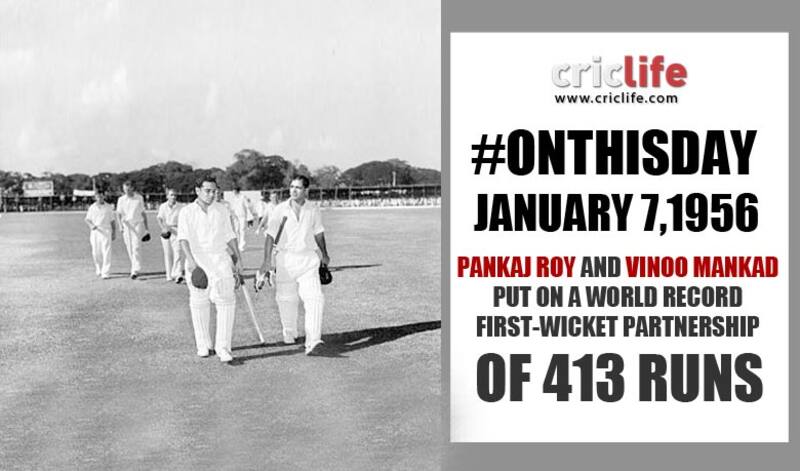
Cricket Country Staff
Editorial team of CricketCountry.
Written by Cricket Country Staff
Published: Jan 07, 2015, 07:49 PM (IST)
Edited: Jan 07, 2015, 07:49 PM (IST)

On this day, 59 years back, Indian openers Vinoo Mankad and Pankaj Roy shared a 413 runs partnership for the first wicket against New Zealand at Corporation Stadium in Chennai (then Madras). This stood as a record for 52 years, until South Africa’s Graeme Smith and Neil McKenzie surpassed it in 2008, when they shared a 415 run stand against Bangladesh at Chittagong.
It was the fifth Test against New Zealand, during their India tour in 1955-56. India were already leading the series 1-0.
Mankad and Roy opened the innings for India, and the duo batted throughout the day. India were 234 for the loss of no wickets at the end of the first day, with Mankad on 109 and Roy on 114. They became the pair to bat throughout the day on a first day of a Test.
On the second day, Mankad and Roy overtook the highest partnership by an Indian pair in First-Class, which was 293. The record was between Mankad and Vijay Merchant against Sussex in 1946.
The next record they broke was the then world record of first wicket partnership of 359 between England’s Len Hutton and Cyril Washbrook.
Mankad went on to score his second double ton of the series. Prior to that, Don Bradman and Wally Hammond had recorded two double centuries in one series.
Roy was out for 173 after being bowled by leg-spin bowler Matt Poore. The partnership was thus broken at 413. Mankad went on to score 231, which remained his highest First-Class score. India beat the Kiwis by an innings and 109 runs, to take the series 2-0.
This website uses cookies so that we can provide you with the best user experience possible. Cookie information is stored in your browser and performs functions such as recognising you when you return to our website and helping our team to understand which sections of the website you find most interesting and useful.
Strictly Necessary Cookie should be enabled at all times so that we can save your preferences for cookie settings.
If you disable this cookie, we will not be able to save your preferences. This means that every time you visit this website you will need to enable or disable cookies again.
